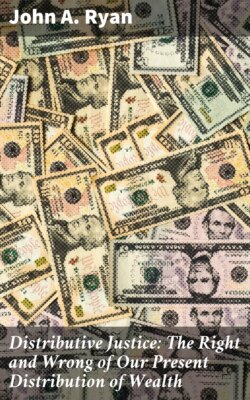Читать книгу Distributive Justice: The Right and Wrong of Our Present Distribution of Wealth - John A. Ryan - Страница 22
На сайте Литреса книга снята с продажи.
ОглавлениеAs a producer of land values, the community is not on the same moral ground with the shoemaker. Its productive action is indirect and extrinsic, instead of direct and intrinsic, and is merely incidental to its principal activities and purposes. Land values are a by-product which do not require the community to devote thereto a single moment of time or a single ounce of effort. The activities of which land values are a by-product, have already been remunerated in the price paid to the wage-earner for his labour, the physician for his services, the manufacturer and the merchant for their wares, and the municipal corporation in the form of taxes. On what ground can the community, or any part of it, set up a claim in strict justice to the increased land values? The right of the members of the community to the means of living and self development is not dependent upon the taking of these values by the community. Nor are they treated as instruments to the welfare of the private owners who do get the socially created land values; for they expend neither time nor labour in the interest of the latter directly. Their labour is precisely what it would have been had there been no increase in the value of the land.
Since social production does not constitute a right to land values nor to rent, it affords not a shadow of justification for the confiscation of these things by the community. If social appropriation of socially created land values had been introduced with the first occupation of a piece of land, it might possibly have proved more generally beneficial than the present system. In that case, however, the moral claim of the community to these values would have rested on the fact that they did not belong to anybody by a title of strict justice. They would have been a "res nullius" ("nobody's property") which might fairly have been taken by the community according as they made their appearance. The community could have appropriated them by the title of first occupancy. But there could have been no moral title of social production. When, however, the community or the State failed to take advantage of its opportunity to be the first occupant of these values, when it permitted the individual proprietor to appropriate them, it forfeited its own claim. Ever since it has had no more right to already existing land values than it has to seize the labourer's wages or the capitalist's interest,—no more right than one person has to recover a gift or donation that he has unconditionally bestowed upon another.
To sum up the conclusions of this chapter: The argument against first occupancy is valid only with regard to the abuses of private ownership, not with regard to the institution; the argument based upon the title of labour is the outcome of a faulty analysis, and is inconsistent with other statements of its author; the argument derived from men's equal rights to land merely proves that private ownership does not secure perfect justice, and the proposal to correct this defect by confiscating rent is unjust because it would produce greater evils; and the so called production of the social values of land confers upon the community no property right whatever.
